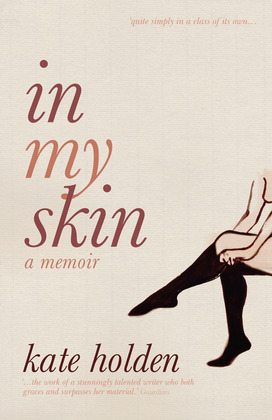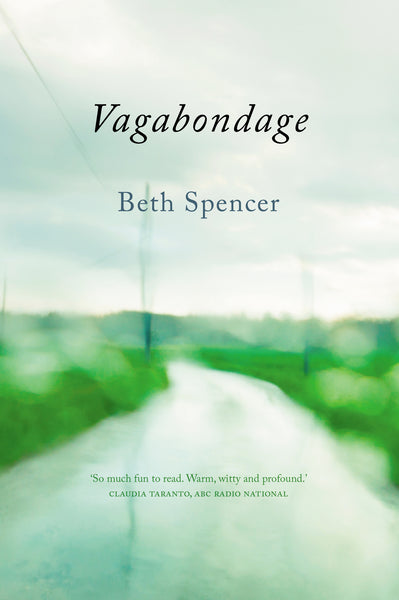 Freese weaves a narrative rich in human frailty and humanity. His reflections regarding life, affection and the way we all change and become who we are now, may serve to motivate the reader toward exploring and perhaps setting down memories for themselves. Freese’s writing is distinctive and well-written with universal appeal. Tesserae is a work to be read and perhaps re-read, for the perceptions it offers into memory and the nature of the self.
Freese weaves a narrative rich in human frailty and humanity. His reflections regarding life, affection and the way we all change and become who we are now, may serve to motivate the reader toward exploring and perhaps setting down memories for themselves. Freese’s writing is distinctive and well-written with universal appeal. Tesserae is a work to be read and perhaps re-read, for the perceptions it offers into memory and the nature of the self.
Tag: memoir
A review of In My Skin and The Romantic by Kate Holden
 Reading Kate Holden’s In My Skin and The Romantic together is a little unsettling. It almost feels as though a third part in the trilogy is missing: the story where the protagonist finds peace. The character arc from one book to another is quite powerful, taking Holden through a series of major changes – some terrifying and some quite wonderful Both books are confronting in very different ways.
Reading Kate Holden’s In My Skin and The Romantic together is a little unsettling. It almost feels as though a third part in the trilogy is missing: the story where the protagonist finds peace. The character arc from one book to another is quite powerful, taking Holden through a series of major changes – some terrifying and some quite wonderful Both books are confronting in very different ways.
A review of That Fry Boy by James Fry

A review of The Last Thread by Michael Sala
 Life isn’t always a linear path though, and there is a strong though subtle meta-fictional aspect to this story that reminds us we are always working towards a broader meaning making than a single story might provide. It’s here that the themes re-emerge, along with questions about genetic inheritance, about how we make and remake ourselves, how meaning is created, and the role of language and love in all of its forms. The Last Thread is about all of those threads and more.
Life isn’t always a linear path though, and there is a strong though subtle meta-fictional aspect to this story that reminds us we are always working towards a broader meaning making than a single story might provide. It’s here that the themes re-emerge, along with questions about genetic inheritance, about how we make and remake ourselves, how meaning is created, and the role of language and love in all of its forms. The Last Thread is about all of those threads and more.
A review of Bad Behaviour by Rebecca Starford
 The writing is beautiful throughout, without ever over-shadowing the plot or narrative flow, which moves forward quickly. Starford remains non-judgmental, even towards those who caused her the greatest pain, including the many adults who clearly failed in their duty of care.
The writing is beautiful throughout, without ever over-shadowing the plot or narrative flow, which moves forward quickly. Starford remains non-judgmental, even towards those who caused her the greatest pain, including the many adults who clearly failed in their duty of care.
A review of M Train by Patti Smith
 Smith would have us believe that
Smith would have us believe that
A review of Iran, My Grandfather by Ali Alizadeh
 It’s the story of many things at once: a country torn apart by power factions and manipulation, a story of a man and what happened to his patriotism over time, a story about genetic and cultural inheritance, a story about migration, and above all, what it means to lose a home—something as relevant today as it was during the time of Alizadeh’s migration.
It’s the story of many things at once: a country torn apart by power factions and manipulation, a story of a man and what happened to his patriotism over time, a story about genetic and cultural inheritance, a story about migration, and above all, what it means to lose a home—something as relevant today as it was during the time of Alizadeh’s migration.
A review of Small Acts of Disappearance by Fiona Wright
 These are close and moving readings that provide depth and personal insight into the narrative framework, the themes that pivot around mental illness and hunger, and the characters that become Wright’s partners through her own recovery. It’s not a facile recovery though. The memory of hunger is almost as acute as the hunger itself.
These are close and moving readings that provide depth and personal insight into the narrative framework, the themes that pivot around mental illness and hunger, and the characters that become Wright’s partners through her own recovery. It’s not a facile recovery though. The memory of hunger is almost as acute as the hunger itself.
A review of To Banquet with the Ethiopians by Philip Brady
 Brady paints a wide spectrum that not only includes the world of ancient Greece and Ethiopia but also the terrain of Queens, New York, where he grew up. Brady’s book makes known the impact of the Homeric texts on the young life of the protagonist.
Brady paints a wide spectrum that not only includes the world of ancient Greece and Ethiopia but also the terrain of Queens, New York, where he grew up. Brady’s book makes known the impact of the Homeric texts on the young life of the protagonist.
A review of Vagabondage by Beth Spencer
 Though the poetry is easy to read and instantly accessible, the work operates on several levels. There is the political: the woman dispossessed, unable to afford rising Melbourne property prices (and a later nod to the global financial crisis; there is the spiritual: the idea of letting go of attachments and expectations: “I am a whisper/of butterflies”; and there is the tangible: the poet’s attempts to make a coherent life and create meaning during this period of intransience.
Though the poetry is easy to read and instantly accessible, the work operates on several levels. There is the political: the woman dispossessed, unable to afford rising Melbourne property prices (and a later nod to the global financial crisis; there is the spiritual: the idea of letting go of attachments and expectations: “I am a whisper/of butterflies”; and there is the tangible: the poet’s attempts to make a coherent life and create meaning during this period of intransience.